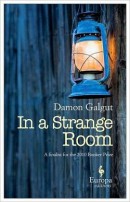 Galgut’s novel, shortlisted for this year’s Booker Prize, is divided into three sections, “The Follower,” “The Lover,” and “The Guardian,” each of them following a character named Damon and each set in a different country. As Adam Langer writes in the New York Times: “Each title represents a role at which the narrator finds himself unable to succeed, a relationship to another human being that he cannot fulfill.”
Galgut’s novel, shortlisted for this year’s Booker Prize, is divided into three sections, “The Follower,” “The Lover,” and “The Guardian,” each of them following a character named Damon and each set in a different country. As Adam Langer writes in the New York Times: “Each title represents a role at which the narrator finds himself unable to succeed, a relationship to another human being that he cannot fulfill.”
In the Guardian, Jan Morris says the novel functions as great travel writing: “Just as Geoff Dyer’s fictional Jeff in Venice, Death in Varanasi seemed to me incidentally the best travel book of 2009, so I doubt if any book in 2010 will contain more memorable evocations of place than In a Strange Room.”
John Self calls the book “an original and inspiring work of art,” and finds Galgut’s tactic of switching between the third and first person particularly effective: “The first story is set in 1993, the last one just a few years ago, and the ‘I’ appears more and more frequently as the book progresses: the memories are becoming clearer, the person described experiencing the events is closer to the person recalling them. It is a lovely technique, eloquent and economical.”
Several reviews single out the last section, in which Damon accompanies a suicidal friend named Anna to India, as the standout: Self says, “The depiction of Anna is gripping, urgent and real as she heads for ‘her toxic, terminal rapture.’” And William Skidelsky says, “Galgut spares no details and the whole episode, suspended between horror and comedy, is almost unbearably powerful.”
There also seems to be a shared experience of admiring the book a great deal despite reservations while in the middle of it. Self writes, “I have surprised myself in writing this review by having nothing negative to say about In a Strange Room. At the time I felt lightly disappointed by it . . . Yet in writing about it, revisiting it, I have only praise.” Skidelsky says, “The narrator’s fatalism and, in ‘The Guardian,’ his occasionally lugubrious tone can become oppressive. But the elegance of Galgut’s writing and the relentless and uncompromising pursuit of his themes are remarkable.”
And Morris writes:
There is a good deal of unhappiness in the book: sadness and bickering and the sort of threadbare despair that goes in bad dreams with the loss of a railway ticket or a forgotten deadline. Humor is not Galgut’s strong point, not even black humor, and there is a kind of nihilism to the book’s philosophy. . . . Oddly enough, though, In A Strange Room has left me with a soothing sense of serenity. It is a very beautiful book for one thing, strikingly conceived and hauntingly written, a writer’s novel par excellence without a clumsy word in it.
In a Strange Room by Damon Galgut
Europa Editions, 224 pp., $15.00

